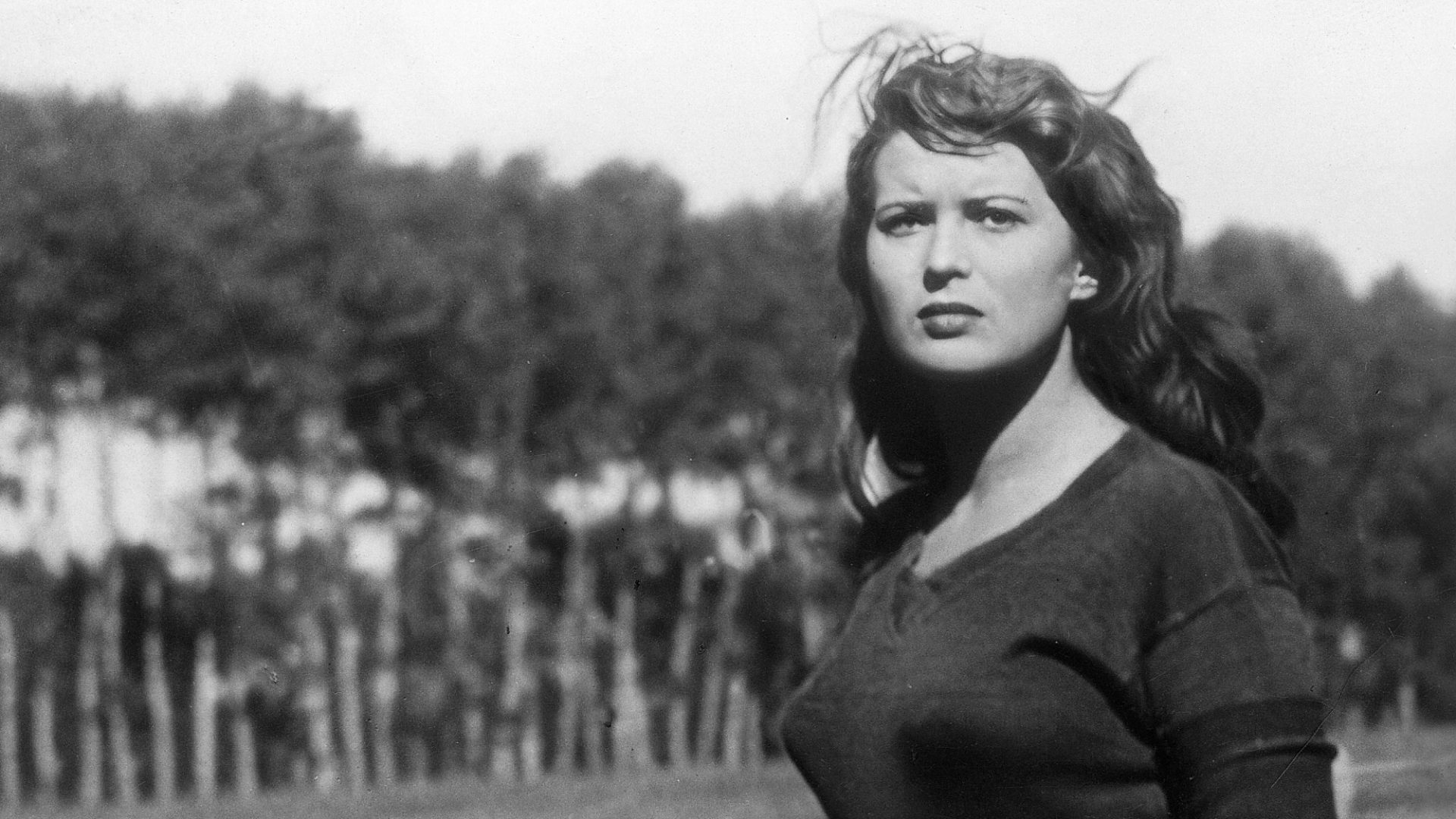She stands knee-deep in the water of a rice field in the Po Valley, looking past the camera with an expression combining curiosity and bristling effrontery. She wears a dark v-neck sweater and very short shorts, her stockings rising halfway up her thighs. This was glamour at its most unglamorous, beauty in poverty. A long way from the traditional image of the screen siren, this was unabashed, defiant womanhood.
A still from the 1949 film Riso Amaro (Bitter Rice), the image became one of the most famous images from postwar European cinema and helped make a star of 19-year-old Silvana Mangano in her first leading role.
Mangano’s overt sexuality underpinning her understated performance in Riso Amaro led Dilys Powell to call Mangano “the most seductive creature since Salome”. Italo Calvino would describe her as a modern Botticelli’s Venus, “but with a prouder face, proud and sweet at the same time” and for the novelist Alberto Moravia, Mangano’s face “had that rare thing in Italy, a beauty not contaminated by social class”.
Riso Amaro turned out to be effectively the last hurrah of Italian realist cinema but Mangano’s performance helped make it a huge hit across Europe and beyond. Great things were predicted for its teenage star but great things, at least in the traditional cinema sense, never happened.
Mangano would be spoken of in the same breath as Sophia Loren – whose breakthrough film, 1954’s La donna del fiume (The River Girl), was almost a carbon copy of Riso Amaro – and Gina Lollobrigida, but Mangano had not the slightest interest in fame. She was barely interested in making films, in fact, and had only accepted the role in Riso Amaro because she needed the money.
Naturally shy and reserved, celebrity was the last thing Silvana Mangano either wanted or needed. As far as she was concerned, the only genuinely positive aspect of the Riso Amaro experience was falling in love with the film’s producer Dino De Laurentiis, whom she married a year later. The nuptials inevitably bound her to the film industry, however, her husband becoming increasingly insistent that she be cast in his productions however reluctant she might have been.
Having grown up during the second world war in intense poverty, born in Rome to railway worker Amadeo Mangano and his wife, Ivy Webb from Croydon, Mangano had already seen enough of the world by the end of her teens to recognise the fickleness of celebrity and fame.
At 16 she won the Miss Rome beauty contest which triggered offers of modelling work that in turn attracted the attention of the city’s film studios, not least an image of her flashing the
“V for victory” sign used on an election poster for the Christian Democratic Party. The studios were also attracted by the fact that she was at the time in a relationship with near-neighbour and up-and-coming actor Marcello Mastroianni.
Riso Amaro appealed to her because it was a film of substance portraying the kind of world with which she was already familiar, the mondine, the poor women who traditionally travelled to the Po Valley to harvest the rice crop. She did not anticipate the film’s worldwide success nor the kind of attention it brought. The New York Times, for example, described her as “Anna Magnani minus 15 years, Ingrid Bergman with a Latin disposition and Rita Hayworth plus 25 pounds”.
When she became pregnant soon after her marriage, Mangano was determined to focus on her family but de Laurentiis was equally determined to capitalise on her fame. She played a nun in 1951’s Anna, a sex worker in L’oro di Napoli in 1954 and the same year appeared as both Circe and Penelope opposite Kirk Douglas in Ulysses.
By 1967 she was mother to four children and making fewer screen appearances but that year de Laurentiis persuaded her to appear in the anthology film Le streghe (The Witches), in which she worked with Luciano Visconti and Pier Paolo Pasolini. Both were impressed enough to cast her in films of their own: she was a statuesque Jocasta in Pasolini’s Oedipus Rex and starred in a trio of films for Visconti, playing Cosima Wagner in Ludwig and, in her most memorable role since her breakthrough, Tadzio’s mother in 1973’s epic Death in Venice.
Wafting wordlessly through the Hotel des Bains, Mangano’s performance was an enigmatic throwback to the golden age of silent cinema, the antithesis of the raw sensuality of Riso Amaro. Two years later she was widely praised for her role opposite Burt Lancaster in Visconti’s Conversation Piece.
Yet still she would only accept occasional roles, keen to remain out of the limelight. De Laurentiis moved the family to Los Angeles in 1973 but Mangano hated the city, spending as little time there as she could. Instead, she stayed for long periods at their homes in Madrid and Paris, retreating even further from the spotlight after 1981 when her son Federico was killed in a plane crash in Alaska while filming a documentary.
Grief for her son turned Mangano into a virtual recluse, spending most of her time weaving tapestries and embroideries. It also spelled the end of her marriage. In 1987, however, she was finally tempted back to the screen to star opposite her childhood sweetheart Marcello Mastroianni in Oci ciornie (Dark Eyes). De Laurentiis had always been uncomfortable at the prospect of Mangano working with her former lover – something that cost her the role in La Dolce Vita that went to Anouk Aimée – but freed from his influence she revelled in the collaboration.
“Marcello could never forget me because once, while we were kissing on a bench, he noticed a voyeur watching us,” she recalled. “He went to punch him but the guy moved and Marcello hit a tree trunk instead. After that, every time he felt a pain in his thumb, he thought of me.”
Mastroianni was inspired to give a performance that earned him Best Actor at Cannes and an Academy Award nomination, but there would be no further opportunities for the couple to work together. Mangano was already being treated for the stomach cancer that would kill her in 1989 at the age of 59.
For a woman who never desired the limelight, Silvana Mangano achieved cinematic immortality almost in spite of herself. Mystified by her success, she felt she brought nothing to the screen. On a film set, she said, “I become a docile robot letting the director guide me because, after all, the public must be satisfied. But me? I have no passion for cinema”.




